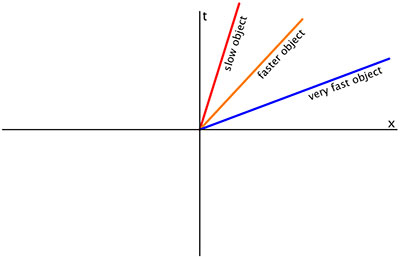From what I've read, according to relativity, a photon does not "experience" the passage of time. (Can we say there is no past/present/future for a photon?)
Would it be better to say a photon is "fixed in spacetime"? If so, how do we explain the apparent movement of a photon? Is everything else moving relative to it in spacetime?
Answer
Because spacetime includes both multiple points in space and multiple moments in time, you have to think of a particle as a line (or a 1D curve) through spacetime, not a point. The line is called the world line. It's made up of all the $(x,t)$ points at which the particle exists: in other words, if you, as an external observer, measure the particle's position $x$ (using your own rulers) at a bunch of different times $t$ (using your own clock), and plot all those points on a graph, and connect them, you get a world line.

You could say that the world line itself is fixed in spacetime. But that's not a particularly useful statement to make, because there's no separate time outside of spacetime, so it's not like the world line can actually move. Besides, even if you did say the world line is fixed in spacetime, that applies equally well to massive particles and to photons.
You can pick any two points on a world line and figure out how much time elapses, by your clock, between those two points. It's just $t_2 - t_1$. You can also figure out how much time elapses, by some other observer's clock, between those two points: it's $\frac{t_2 - t_1}{\sqrt{1 - v^2/c^2}}$, where $v$ is the relative velocity between you and the other observer. And you can even try to apply this calculation treating the particle itself as the observer, which lets you figure out how much time passes for the particle between those two points. It works out to $\sqrt{(t_2 - t_1)^2 - (x_2 - x_1)^2/c^2}$. This works just fine for a massive particle. But for a photon, no matter which two points you pick, the answer you get is zero. This is why we say that photons don't experience time. I don't think it's accurate in general to say that photons are fixed in time, though. That might be a useful thing to say to make a particular point in a particular argument, but in most cases, it's probably more misleading than not.
No comments:
Post a Comment